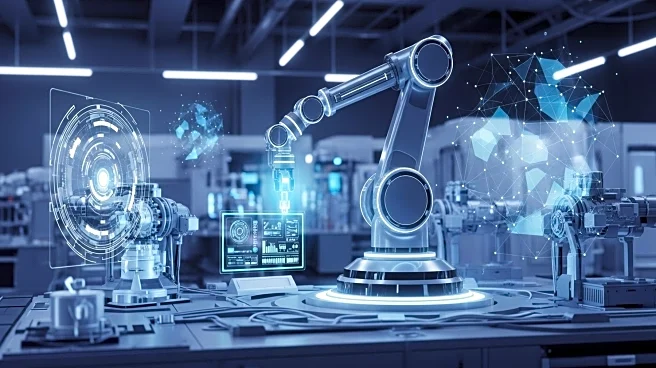What is the story about?
What's Happening?
The 2025 World Manufacturing Convention is set to take place from September 20 to 23 in Hefei, the capital of Anhui Province, China. This event will focus on advanced manufacturing and frontier technologies, drawing participants from over 40 countries and regions. The convention will feature an intelligent robotics exhibition, showcasing robots in community and household settings to demonstrate their potential applications in daily life. Anhui Province, once primarily agricultural, has transformed into a hub for emerging industries, leading in automobile production, new energy vehicle (NEV) output, and auto exports in China. The province now produces significant portions of the world's display panels, industrial robots, NEVs, and photovoltaic glass. Companies like JAC Motors, Huawei, and Chery will present new smart electric models and advanced technologies at the convention.
Why It's Important?
The convention underscores China's strategic focus on becoming a leader in smart manufacturing and frontier technologies. By showcasing advancements in robotics, NEVs, and quantum computing, China is positioning itself at the forefront of global technological innovation. This development has significant implications for the U.S. and other global economies, as it highlights China's growing influence in key industries. The emphasis on NEVs and smart technologies could impact global markets, potentially challenging U.S. companies in these sectors. Additionally, China's investment in frontier technologies like quantum computing and fusion technology could shift the balance of technological leadership, affecting international collaborations and competitive dynamics.
What's Next?
The convention is expected to foster international collaborations and partnerships, as foreign participants make up a significant portion of attendees. The focus on smart manufacturing and frontier technologies may lead to increased investments and joint ventures between Chinese and international companies. As China continues to expand its capabilities in these areas, U.S. companies and policymakers may need to reassess their strategies to maintain competitiveness. The outcomes of the convention could influence future trade policies and technological collaborations between China and other nations.
Beyond the Headlines
The convention's focus on intelligent robotics and quantum computing highlights ethical and security considerations. The integration of advanced robotics in daily life raises questions about privacy, job displacement, and the ethical use of technology. Similarly, advancements in quantum computing could have significant implications for cybersecurity and data protection. As China advances in these areas, global stakeholders will need to address these challenges to ensure responsible and secure technological development.

















